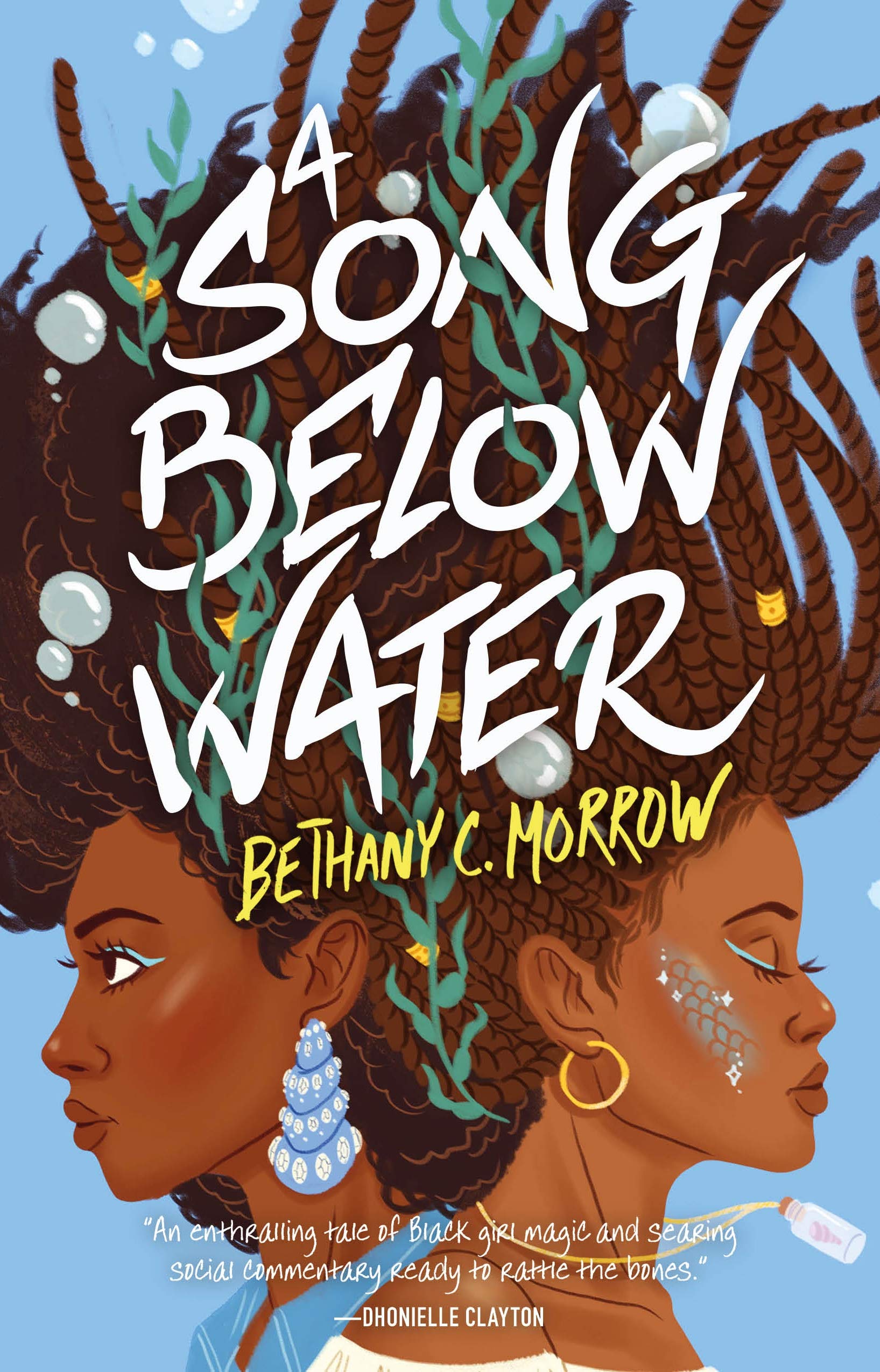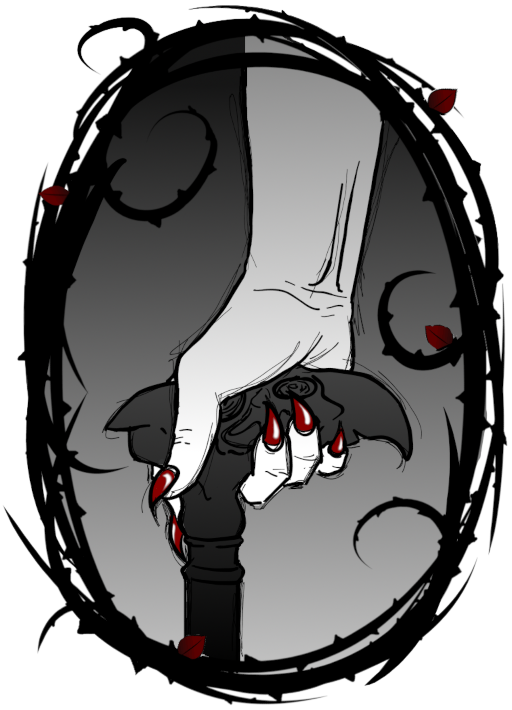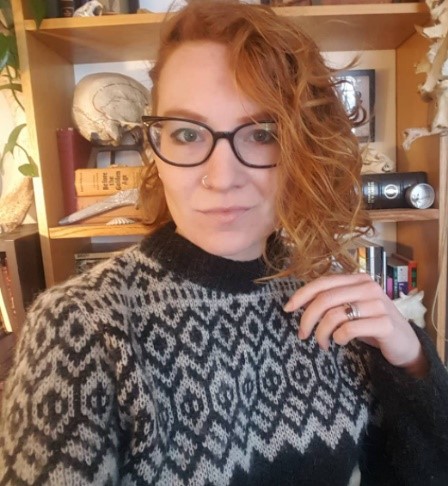Today, Sirens research coordinator and master of books Kallyn Hunter interviews bookseller and all-around book genius Nicole Brinkley.
KALLYN HUNTER: How and when did you fall in love with fantasy—or perhaps science fiction—literature? What does this genre mean to you?
NICOLE BRINKLEY:The real world is difficult enough, especially right now, and especially as somebody with an anxiety disorder. Fantasy allows escapism: both to take a break from the world I often find so overwhelming and to process the issues within this world in a way that doesn’t immediately stress.
It’s what I’ve loved since I was little. Whenever we visited our local mall as a child, I would hightail it to our Waldenbooks and curl up in a corner, working my way through the entire Secrets of Droon series. I combed through the stacks of our three local libraries, hunting for something to satiate my need for the magical. One of my most vivid memories is finding Through Wolf’s Eyes by Jane Lindskold in the deep recesses of the adult section and falling in love with it.
Fantasy is where my heart lies. It’s everything I love about our world and everything I want this world to be. It challenges me to be better and to make the world around me better . . . while keeping me sane at the same time.
KALLYN: In an essay you wrote for Tor.com last fall, you spoke so passionately about the evolution of the science fiction and fantasy shelves in bookstores—and about how readers are changing the industry, from what gets published to what is available in bookstores. As a bookseller—and as, let’s not forget, a reader—what do you hope for the future of the business of SFF books?
NICOLE: It’s weird to think that I want SFF to become more “mainstream,” considering how popular sci-fi and fantasy media is. Marvel films and shows like Game of Thrones are some of the biggest moneymakers in the world. Yet, within the bookselling community, SFF books are often relegated to the sidelines. The success of books within those communities are exceptions, not rules—and often, those successes are considered literary books with a dash of magic, not real fantasy. (That’s why you see Erin Morgenstern so often shelved in general fiction and not relegated to the SFF sections of bookstores.)
Within the world of bookselling, I want to see more people reading SFF. Not just books like Morgenstern’s, where booksellers can pretend they’re not reading SFF, but books deep within the genre: Leckie and Jemisin and Carriger and Okorafor and McGuire. I want to see them upheld and hand-sold and brought to bookselling conferences.
Within the world of publishing, I want to see SFF pushed more at bookselling conferences—but I also want to see more inclusive, joyous books published. Right now, books by and about people of color, and books by and about queer folks, and especially books where those identities intersect—they’re often relegated into a more torturous sort of story. L.L. McKinney talked about this quite elegantly on Tor.com. I don’t just want books about queer folks that are parallels for homophobia in our own world, and I don’t just want books about people of color where they’re still struggling against magical racism or other issues. I want books that are genuinely joyous, more in the vein of the Wayward Children series or The House in the Cerulean Sea or Binti: where genuine joy is taken in your identity, where it’s not a negative to be explored, where it affects the story without being an obstacle to overcome.
Bring me joyous fantastical stories, and make them mainstream.
KALLYN: You are an amazing hand-seller of books: all sorts of books to all sorts of people. What’s your approach? How do you match a reader with the right book?
NICOLE: I did a deep dive into the art of hand-selling over on my Patreon! Having a wide knowledge of books obviously helps, but the most important thing is to talk to the person looking for the book. You want to find books that match what a specific reader is in the mood for—and in order to do that, you need to ask questions. What books have you read recently and liked? What are you in the mood for? Do you prefer something realistic or something more fantasy? Serious or funny? How old are you? What other things do you like that aren’t books?
As a bookseller, it’s not about taking a specific book and selling it to anybody. The whole art of hand-selling resides in matching a reader to the book they want, the book that is appropriate for them, not just what you read most recently. (And yes: that does mean simultaneously hand-selling directly to children who will be reading the book and the parents with the wallet trying to guide their reading. High charisma rolls are necessary in the RPG game of bookselling, baby!)
And here’s a secret for authors: It’s totally okay to say, “Oh, I don’t think my book is what you’re in the mood for. It’s about X. But you’ll love Y!” It shows that you’re listening to the reader and that you understand the kinds of books they do like—which makes them more likely to pick up your books in the future when they do want to read them, rather than trying to weasel your way in when it’s not quite the right fit. Hand-selling can be a long game, too.
KALLYN: You were one of the founders of the (now-discontinued) YA Interrobang, which focused on news, features, and analysis of all things YA books. Why do you find that work like this is important? Why is creating and facilitating these conversations something that you poured so much of yourself into for so long?
NICOLE: When we love something, it’s not enough to accept it. We should want to make it better. We should want to challenge it as much as we want to embrace it. It’s why I’m so hard on the bookselling community nowadays, and it’s why I spent so long on YA Interrobang informing people about YA, talking about the gaps in the market, and uplifting authors and other voices trying to fill those gaps.
I haven’t stopped having those discussions: I’ve simply switched the way in which I have them. While I still actively discuss literature in public on Instagram or through articles on other websites, I also do a lot of work within my own communities: researching, discussing, doing back-channel pushes and trying to make change in more subtle and more nuanced ways. (As we all know, social media and short blog posts are not always the best place for nuance!) I’m also still actively trying to learn more and do better, which means being quieter and listening and reading books like The Dark Fantastic.
We can all do better, and be more inclusive, and we all still have more to learn.
KALLYN: Why did you first decide to come to Sirens? And then why did you decide to come back to Sirens?
NICOLE: I eyed Sirens for a long time and didn’t have the funds to go—and then the incredible Katherine Locke sponsored a spot for me, paying for my entire trip when they realized they were no longer able to attend.
I absolutely fell in love.
In college, I joined our college chapter of the Harry Potter Alliance: Dumbledore’s Army of New Paltz. It was a group full of thoughtful queer people who used their love of SFF to try and make the world a better place, and they’re some of my best friends to this day.
(Hey, J.K. Rowling, if you’re reading this: trans women are women! Women aren’t the only people who have periods and get pregnant! You’re [redacted].)
Attending Sirens is the closest vibe I’ve ever come to that group. It’s a thoughtful, inclusive space that focuses on fantasy and fandom while pushing to make those spaces better. I immediately felt comfortable . . . and the journal full of notes I took from my time there challenged my brain in exactly the right way.
KALLYN: Sirens is about discussing and deconstructing both gender and fantasy literature. Would you please tell us about a woman or nonbinary person—a family member, a friend, a reader, an author, an editor, a character, anyone—who has changed your life?
NICOLE: I’ve met so many incredible people over the past few years, especially current and former booksellers: Rebecca Kim Wells, and Stephanie Heinz, and Stephanie Appell, and Read Davison, and Clarissa Hadge.
But if I’m going to tout one person who has changed my life especially within the realm of SFF, it’s gotta be Abby Rauscher. Abby is the kidlit buyer at Books are Magic in NYC, but more importantly, they’ve become one of my best friends over the past few years. They’re brilliant and smart, and their taste in SFF is superb—but they’re also wildly supportive. They’re always there on my worst days and pushing me to be better.
And they spent New Year’s Eve helping me move into my new apartment. I mean, come on. You can’t ask for a better friend than that.
I’m so excited to see what they do in the future, and I’d love to get them to Sirens at some point. I think they’d have an absolute blast.
Nicole Brinkley has short hair and loves dragons. The rest changes without notice. She is the manager of Oblong Books & Music in Rhinebeck, NY.
Kallyn Hunter is a researcher, writer, and knight from northern Colorado. When she isn’t in front of a computer, she can be found traveling the wilds of her state with her adventure-Pomeranian or smashing the patriarchy with her theatrical jousting troupe, the Knights of the Tempest. She has been a member of the Sirens community since 2011 and has an endless to-read pile because of it.





 Faye Bi is the director of publicity at Bloomsbury Children’s Books, and spends the rest of her time reading, cycling, pondering her next meal, and being part of the Sirens communications team. She’s yet to read an immigrant story she hasn’t cried over, and is equally happy in walkable cities and sprawling natural vistas. You can follow her on Twitter
Faye Bi is the director of publicity at Bloomsbury Children’s Books, and spends the rest of her time reading, cycling, pondering her next meal, and being part of the Sirens communications team. She’s yet to read an immigrant story she hasn’t cried over, and is equally happy in walkable cities and sprawling natural vistas. You can follow her on Twitter 











































 V. S. Holmes is an international bestselling author. They created the Reforged series and the Nel Bently Books. Smoke and Rain, the first book in their fantasy quartet, won New Apple Literary’s Excellence in Independent Publishing Award in 2015. In addition, they have published short fiction in several anthologies. When not writing, they work as a contract archaeologist throughout the northeastern U.S. They live in a Tiny House with their spouse, a fellow archaeologist, their not-so-tiny dog, and own too many books for such a small abode. As a disabled and queer human, they work as an advocate and educator for representation in SFF worlds. For more information about V, please visit their
V. S. Holmes is an international bestselling author. They created the Reforged series and the Nel Bently Books. Smoke and Rain, the first book in their fantasy quartet, won New Apple Literary’s Excellence in Independent Publishing Award in 2015. In addition, they have published short fiction in several anthologies. When not writing, they work as a contract archaeologist throughout the northeastern U.S. They live in a Tiny House with their spouse, a fellow archaeologist, their not-so-tiny dog, and own too many books for such a small abode. As a disabled and queer human, they work as an advocate and educator for representation in SFF worlds. For more information about V, please visit their 


Connect with the Sirens community
Sign up for the Sirens newsletter